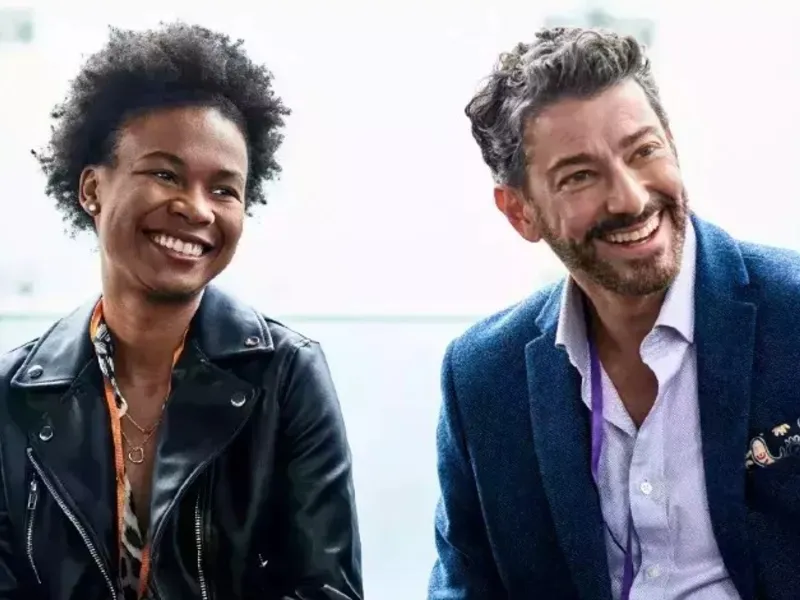Insights & News page
Capita Senior Learning Consultant James Eynon meets with a range of learning and development (L&D) practitioners across industries and sectors to discuss the big questions in learning. James and his guests explore how we can all learn and grow at work – and provide you with practical tips along the way.
In this series of 5 podcasts, he will explore the skills that create resilience, inclusivity in skills-based organisations, creating a skills framework, and using technology to embed a skills approach.
We’ll be speaking to experts who have lived & breathed each of these topics, giving you practical insights from real experience.

Listen to our on-demand webinar: Unlocking resilience
In this webinar we discuss the steps to creating a skills-based organisation.
Episode 1 - what is organisational resilience, and what do ‘T-shaped’ skills have to do with it?
The UK Government’s latest Employer Skills Survey reveals that 36% of job vacancies are due to a lack of skills, costing organisations £4.4 billion annually. To address this, multi-skilling and creating skills-based organisations have become priorities. However, only 21% of organisations are effective at multiskilling.
We introduce the concept of ‘T-shaped skills’, where individuals have broad capabilities and deep expertise in specific areas. These skills help organisations manage demand, redefine expertise, and improve team understanding. For example, in a call centre, tracking and developing existing skills can reduce the need for constant hiring. T-shaped skills also free up experts for critical tasks and enhance company culture by fostering mutual understanding among teams.
For individuals, T-shaped skills offer personal growth, motivation, and adaptability, making them valuable and unique. The podcast emphasises the importance of identifying and developing these skills to create efficient, resilient organisations and support individual career progression.
Listen now ➥
Episode 2 – what is personal resilience and how do we develop it?
In this 2nd series, James explores how to create organisational resilience through skills. But when we think about the word ‘resilience’, our first thought is not typically about how well an organisation has multi-skilled its workforce. You’re more likely to associate the word with personal resilience and personal resilience is an important thing to have to be able to effectively move through the same periods of change and uncertainty that organisations as a whole go through.
So, let’s explore that today: what is personal resilience? What are the skills that create it? And how can we develop them effectively?
The discussion is led by two experts: Sian Parr, a Senior Learning Consultant at Capita with a focus on health and wellbeing, and Michael Matania, the Chief Executive of Mycelium, who has a background in mental health and has worked with the UK’s leading mental health organisation, Mind.
⮨ Listen now
Episode 3 - How do we remain inclusive in developing skills-based organisations?
Effective skills-focussed organisations can create a workforce with strong, multi-faceted capabilities, but this can all be undermined if we don’t use inclusive processes along the way. It’s one thing to work out the skills your organisation needs, but how do you inclusively develop them, supporting minority groups to progress & create a truly resilient workforce.
In this episode, James is joined by fellow Capita consultant Justice Onwuka and Amp Up Your Voice Flounder & CEO Johanne Penny to discuss this. They explore how creating a psychologically safe environment fosters adaptability and greater performance, the importance of cultural competence, and the need for effective feedback loops. The conversation also highlights the distinction between mentorship and sponsorship in talent development, emphasising the necessity of investing in diversity and inclusion to retain and attract talent.
Listen now ➥
Episode 4 - how do we create an effective skills framework?
In this episode we’re getting practical, because it’s one thing to identify the skills you need in your teams and organisation, it’s another to actually map those skills into a framework and implement it. Where do you even start with mapping skills / creating a framework? How do you future proof the framework? How can you measure against it?
Helping to answer those questions are Principal Learning Consultant and accredited coach, Becca Hitchman, and Zia Aftab, Group performance and development manager with a focus on career frameworks. Together, they explore how you break down the stages to creating a framework, the important role of line managers in embedding it, and how to measure success.
And, of course, there’s the latest trip to Learning Room 101 where Zia doesn’t need Maslow, and Becca hasn’t got time for mandatory learning…
⮨ Listen now
Episode 5 - how can learning technologies help us develop skills-based organisations?
In the final conversation in the series on skills-based organisations, James speaks to Marc Zao-Sanders, CEO of Filtered Technologies, about the practical implementation of skills mapping and content tagging in learning and development.
They discuss the challenges of creating a skills taxonomy framework, mapping skills to learning content, and the pros and cons of having a large content library.
Marc emphasises the importance of using technology and human expertise to effectively map content to skills, and highlights the interconnectedness of tags, skills, discovery, data, and content in the skills process.
Check out the blog referenced in the conversation here












Share